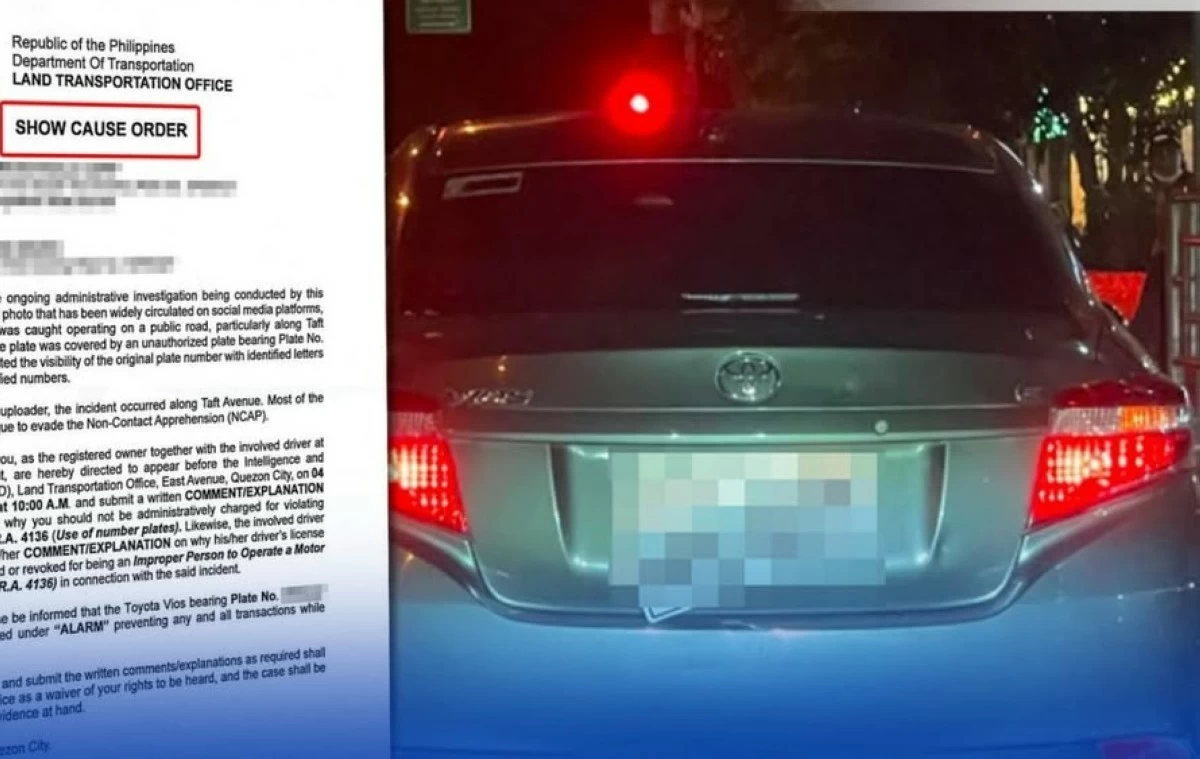Is Your Car at Risk? LTO Sounds Alarm on NCAP Evasion Tactics!

# The Implications of the No-Contact Apprehension Policy (NCAP) and Vehicle Registration Compliance
In the modern world of transportation, adherence to regulations is paramount for ensuring road safety and accountability. The recent alarm raised by the Land Transportation Office (LTO) concerning a viral video depicting a pharmaceutical company vehicle obscuring its license plate highlights a significant issue surrounding the No-Contact Apprehension Policy (NCAP). This article delves into the implications of NCAP, the importance of vehicle registration compliance, and the broader impacts on road safety and regulatory enforcement.
## Understanding the No-Contact Apprehension Policy (NCAP)
The No-Contact Apprehension Policy (NCAP) is an initiative designed to promote traffic discipline without the need for direct confrontation between law enforcement officers and drivers. This policy utilizes technology, such as cameras and surveillance systems, to identify vehicle violations based on captured footage. Here’s how NCAP operates:
1. **Automated Monitoring**: Cameras are installed at strategic locations to monitor traffic and capture violations.
2. **Violation Identification**: Common infractions include running red lights, illegal parking, and driving without a valid license plate.
3. **Notification System**: Once a violation is recorded, the vehicle owner receives a notification via mail or electronic means.
### Benefits of the NCAP
The NCAP offers several benefits, including:
- **Reduced Confrontations**: Minimizing direct interactions between police and drivers can reduce tensions and confrontations.
- **Increased Compliance**: The knowledge that violations are being monitored can encourage drivers to adhere to traffic laws.
- **Streamlined Processes**: Notifications can be processed more efficiently, reducing the burden on law enforcement.
## The Incident: Obscuring License Plates
The recent incident involving the pharmaceutical company vehicle has raised eyebrows and sparked discussions on compliance with vehicle registration laws. The viral video showing the vehicle deliberately covering its license plate appears to be an attempt to evade the consequences of the NCAP. This act poses several concerns:
### Legal Implications
Covering or obscuring a license plate is illegal in many jurisdictions. Potential legal ramifications include:
- **Fines**: Drivers caught obscuring their plates may face substantial fines.
- **Increased Scrutiny**: Such actions can lead to further investigations and heightened scrutiny from law enforcement agencies.
- **Suspension or Revocation of Registration**: Repeated violations can result in the suspension of vehicle registration.
### Ethical Considerations
Beyond the legal implications, this incident raises ethical questions about accountability. Companies, especially those in the pharmaceutical sector, have a responsibility to model good behavior. Evasion tactics undermine public trust and set a poor example.
## Importance of Vehicle Registration Compliance
Vehicle registration compliance is crucial for several reasons:
1. **Safety**: Proper registration helps authorities track vehicles involved in accidents or crimes.
2. **Accountability**: It ensures that vehicle owners are held accountable for their actions on the road.
3. **Revenue Generation**: Registration fees contribute to government revenue, which can be used for road maintenance and safety improvements.
### Consequences of Non-Compliance
Non-compliance with vehicle registration can lead to:
- **Legal Penalties**: Fines and other legal repercussions for the vehicle owner.
- **Insurance Issues**: Insurance claims may be denied if a vehicle is not properly registered.
- **Impact on Business Reputation**: Companies that fail to comply with regulations can suffer damage to their reputation and loss of consumer trust.
## The Role of Technology in Enforcement
As technology continues to evolve, its role in enforcing traffic regulations also expands. The incorporation of advanced technologies such as:
- **Automated License Plate Recognition (ALPR)**: This technology can quickly scan and identify vehicle plates, ensuring that violations are recorded accurately.
- **Mobile Apps for Reporting**: Citizens can use apps to report traffic violations, contributing to a more engaged community.
- **Data Analytics**: Analyzing traffic patterns can help authorities identify high-risk areas and allocate resources effectively.
### Future of Traffic Regulation
The future of traffic regulation may see even more reliance on technology. Potential developments could include:
- **Smart Traffic Signals**: Signals that adapt based on real-time traffic conditions.
- **Drones for Monitoring**: Unmanned aerial vehicles could provide comprehensive surveillance of traffic flows and violations.
- **Enhanced Public Awareness Campaigns**: Educating the public about compliance and the importance of adhering to road regulations.
## Best Practices for Vehicle Owners
To avoid situations like the one involving the pharmaceutical company vehicle, vehicle owners should adhere to the following best practices:
1. **Keep License Plates Visible**: Ensure that license plates are not obscured or covered by any material.
2. **Stay Informed**: Familiarize yourself with local traffic laws and the NCAP.
3. **Timely Registration**: Renew vehicle registration promptly to avoid penalties.
4. **Use Technology**: Consider using apps or services that remind you of registration deadlines and other important vehicle maintenance tasks.
### Encouraging Responsible Behavior
Encouraging responsible behavior among drivers is vital for fostering a culture of compliance. Here are a few strategies:
- **Public Awareness Campaigns**: Educating the public about the importance of vehicle registration and compliance with traffic laws.
- **Community Engagement**: Involving local communities in discussions about road safety and compliance.
- **Incentives for Compliance**: Offering discounts or rewards for timely registration or clean driving records can encourage responsible behavior.
## Conclusion
The incident involving the pharmaceutical company vehicle is a reminder of the importance of compliance with traffic regulations and the potential consequences of evading such rules. The No-Contact Apprehension Policy (NCAP) serves as a critical tool for promoting road safety and accountability, but it relies on the cooperation of vehicle owners. By adhering to vehicle registration laws and promoting responsible driving behavior, we can contribute to safer roads for everyone.
In a world where technology is rapidly advancing, the responsibility lies with vehicle owners to stay informed and compliant. Are you doing your part to ensure road safety and uphold the law?
### FAQs
What is the No-Contact Apprehension Policy (NCAP)?
The NCAP is a traffic enforcement initiative that uses technology to monitor and identify vehicle violations without direct confrontation between law enforcement and drivers.
What are the consequences of obscuring a license plate?
Consequences may include fines, increased scrutiny from law enforcement, and potential suspension or revocation of vehicle registration.
How can vehicle owners ensure compliance with registration laws?
Vehicle owners can ensure compliance by keeping their license plates visible, staying informed about local traffic laws, renewing registration on time, and utilizing technology for reminders.
As we navigate the complex landscape of transportation regulations, it’s essential to consider how we can collectively contribute to safer and more responsible driving practices. What steps will you take to ensure compliance and promote road safety? #RoadSafety #TrafficRegulations #CompliancePublished: 2025-07-02 00:00:14 | Category: Uncategorized



